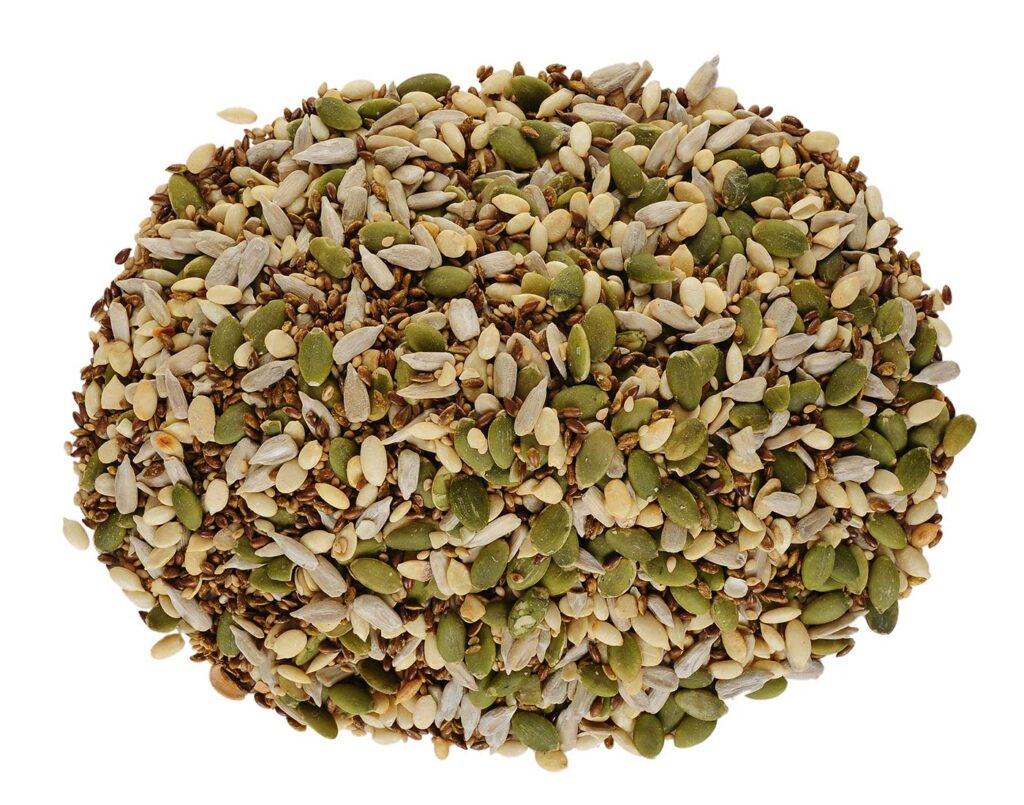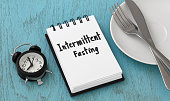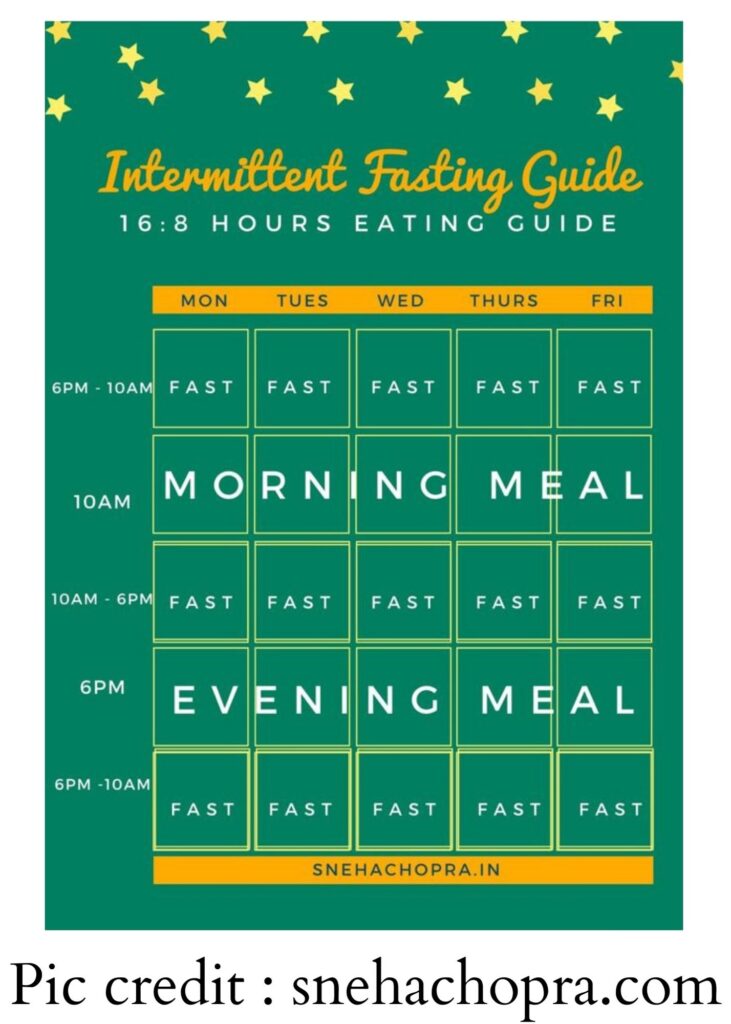Everyone dreams of having a perfect and healthy body. Only a few people have a perfect body and health. Others have to work hard to maintain their body perfectly. But no one says that it is impossible. Maintaining your body and keeping it perfect is possible. People are having difficulties with their weight loss. There are many tips and advice given to them for losing their weight. Today I will be telling you about the Indian diet plan for losing weight.
Intermittent fasting, also known as intermittent energy restriction. Intermittent fasting is an eating pattern where you cycle between periods of eating and fasting. There are many different ways of intermittent fasting methods, all of which split the day or week into eating periods and fasting periods.
Most people already “fast” every day, while they are sleep. Intermittent fasting can be as simple as extending that fast a little longer. You can do this by skipping breakfast, eating your first meal at noon, and your last meal at 8 pm. Then you’re technically fasting for 16 hours every day, and restricting you’re eating to an 8-hour eating window.
Many fewer behavioral changes are required in Intermittent Fasting. The changes were seen in different people after intermittent Fasting are:
- Muscle mass increases
- Body fat decreases
- Spontaneity increases
The decrease in the amount of time in training.
Intermittent Fasting Diet Plan
Diet plan which can help in weight loss. It is rightly said that to avoid sickness eat less. Intermittent fasting helps in scheduling meals to get the most benefits from it. The calorie intake in this diet remains the same as for a weight loss diet. Here is some food composition of intermittent fasting:
- It includes fresh fruits and vegetables for daily vitamins and minerals.
- It is having moderate fat, moderate carbohydrate, and high protein.
- You can opt for whole-grain cereal, millets, and fiber-rich fruits as these things help in weight loss.
- Taking the good quality of proteins like low-fat milk and its products, lean meat, fish, and egg are vital.
- Taking 2-3-liter water daily.
Diet Plan Intermittent Fasting
The exercise you can do in Intermittent Fasting
When you do a Cardio workout then it targets the fat stored in the body.
High-intensity interval training can have a great impact on lean body mass and fat storage.
You must avoid exercise before going to bed as it can disturb your sleep.
Before a workout, have a cup of coffee or green tea an hour ago. It will boost metabolism and help in weight loss.
Intermittent Fasting Diet
It has become a health trend in every country. It helps in weight loss and also maintains our body. There are many methods for an intermittent fasting diet plan. I will be telling you about a few of them:
The 16/8 Method
In this method, the fasting period is between 14-16 hours daily and eating hours are between 8-10 hours. It is an easy method of fasting. In this, you can skip your breakfast and should not eat anything after dinner. During the fast, you can have water, coffee, and other zero-calorie beverages. Within the eating window, you can fit in two, three, or more meals.
This method is also known as the Leangains protocol and was popularized by fitness experts.
It’s very important to eat healthy foods during your eating window. This method won’t work if you eat lots of processed foods or an excessive number of calories. You also need to do exercise so that old storage fat will get burn fast.
Pls see below-attached link for more information-https://snehachopra.com/blog/2020/07/how-to-follow-intermittent-fasting-in-the-right-way-a-comprehensive-intermittent-fasting-guide/
5:2 Diet
In this method, you have to eat normally for 5 days of the week. Then reducing calorie intake between 500 – 600 in the next two days of the weak. It is also called the fast
For example, you might eat normally every day of the week except Mondays and Thursdays. For those 2 days, you eat 2 small meals of 250 calories each for women and 300 calories each for men.
Eat stop eat
It involves 24 hours fast once or twice a week. This method was given by Brad Pilon and is quite popular. You have to fast from one meal of the day to the same meal as the second day. For example, if you had breakfast on Sunday then up to Monday morning breakfast you have to fast to complete 24 hours.
For example, if you finish dinner at 7 p.m. Monday and don’t eat until dinner at 7 p.m. Tuesday, you’ve completed a full 24-hour fast. You can also fast from breakfast to breakfast or lunch to lunch — the end result is the same.
learn how to do 5.2 Intermittent Fasting
Alternate Day Fasting
In this method, you have to fast every Alternate day. For example, you can have a proper diet on Sunday but on Monday you have to fast. On Tuesday you can have a proper diet but on Wednesday you have to fast. This way you fast will go on.
There are several different versions of this method. Some of them allow about 500 calories during the fasting days.
It has been researched that alternate-day fasting wasn’t any more effective at producing weight loss or weight maintenance than a typical calorie-restrictive diet. A full fast every other day can seem rather extreme, so it’s not recommended for beginners.
With this method, you may go to bed very hungry several times per week, which is not very pleasant and probably unsustainable in the long term.
There are two subtypes
- Complete alternate-day fasting (or total intermittent energy restriction), where no calories are consumed on fast days.
- Modified alternate-day fasting (or partial intermittent energy restriction) which allows the consumption of up to 25% of daily calorie needs on fasting days instead of complete fasting. This is eating to alternating days with normal eating and days with a very low-calorie diet.
The Warrior Diet
In this method, you have to eat fruits in a day and eat a heavy meal diet at night time. This means in this you have to fast in the day and should have proper meals at night time. It involves eating small amounts of raw fruits and vegetables during the day and eating one huge meal at night. Basically, you fast all day and feast at night within a 4-hour eating window.
In this method, you have to skip a meal from time to time. You can skip a meal when you are busy or when you are not hungry. In other words, we can say skipping one or two meals in a day is known as spontaneous meal skipping.
1. How It Affects Your Cells, Hormones, Heart disease, and diabetes Also
Body changes hormone levels when we do fasting stored body fat accessible and initiates important cellular repair processes.
Some of the changes that occur in your body during fasting:
Insulin levels- Blood levels of insulin drop significantly, when we fast and facilitate fat burning. Buy this we will lose weight.
- Also, help from Diabetes.
- Blood sugar levels
- Blood pressure
- Blood triglycerides
- Total and LDL (bad) cholesterol
- inflammatory markers
Human growth hormone (HGH) levels. The blood levels of human growth hormone (HGH) may increase dramatically. Higher levels of this hormone facilitate fat burning and muscle gain and have numerous other benefits.
Cellular repair- The body plays important cellular repair processes, such as removing waste material from cells. So there are benefits of intermittent fasting which leads to changes in hormones, the function of cells
2. Intermittent fasting diet plan for Weight Loss
Today time everyone wants to be slim of having a perfect and healthy body. But no one says that it is impossible. Maintaining your body and keeping it perfect is possible for these people who have determined they should not leave any hope. Step by step they will reach success.
If you lose weight you will gain your confidence back and your body will get free from many diseases. So weight loss help in the overall mental and physical health. Also, help from depression is the most face by people days.
Has benefits for your brain
It is good for the body is often good for the brain as well. Intermittent fasting improves various metabolic features known to be important for brain health.
3. Intermittent fasting helps Reduce
- Oxidative stress
- Inflammation
Several studies in mice and rats have shown that intermittent fasting may increase the growth of new nerve cells, which should have benefits for brain function.
Fasting also increases levels of a brain hormone called brain-derived neurotrophic factor (BDNF). A BDNF deficiency has been implicated in depression and various other brain problems.
4. May Help Prevent Alzheimer’s Disease
Alzheimer’s disease is the world’s most common neurodegenerative disease. There’s no cure currently available for Alzheimer’s, so preventing it from showing up in the first place is critical. A progressive disease that destroys memory and other important mental functions. Brain cell connections and the cells themselves degenerate and die, eventually destroying memory and other important mental functions.
Memory loss and confusion are the main symptoms. Fasting helps slow down the progress of this disease.
In a series of case reports, a lifestyle intervention that included daily short-term fasts was able to significantly improve Alzheimer’s symptoms in 9 out of 10 people
Recap & Final Thoughts
The main reason for any dietary change is to have a sustainable and healthy lifestyle that helps you meet your health goals. Whether you’re looking to lose weight or prevent disease, intermittent fasting is one eating style that may work for you. The most important thing with any diet is to get all of your essential macro and micronutrients, appropriate amounts of food, and fiber for a healthy gut microbiome and enjoy your lifestyle in the long run.













































